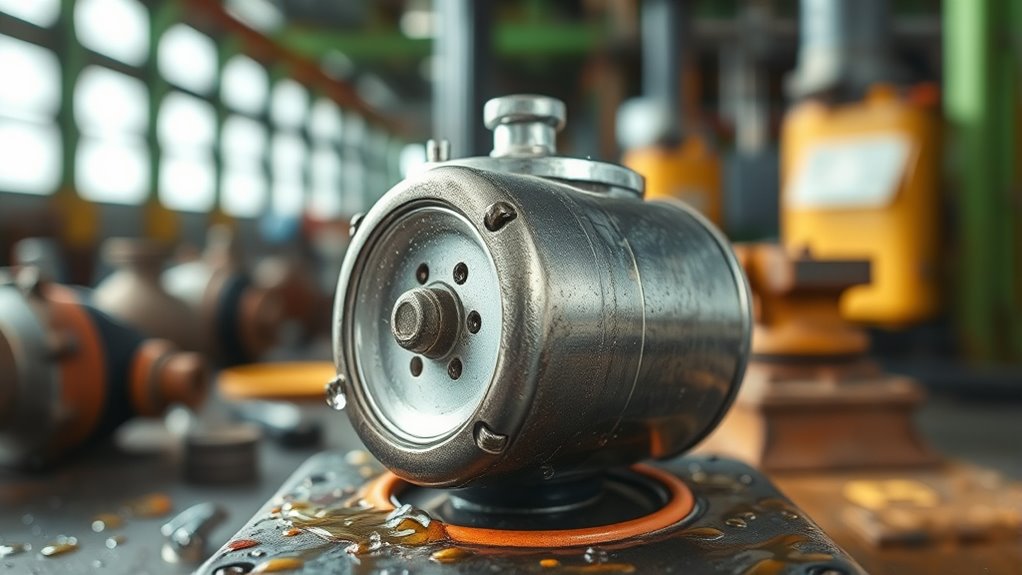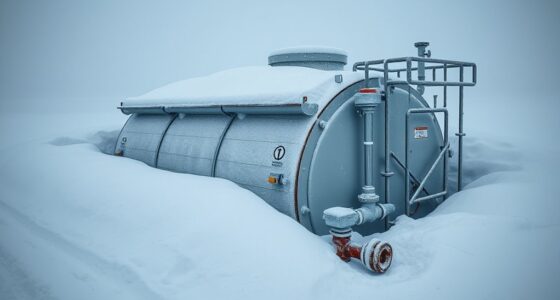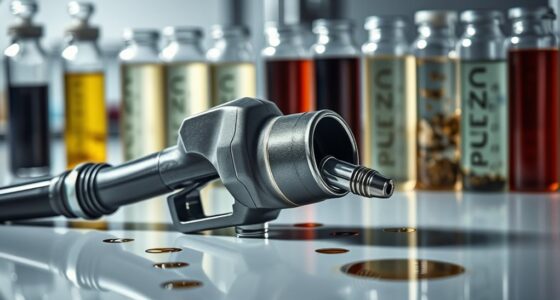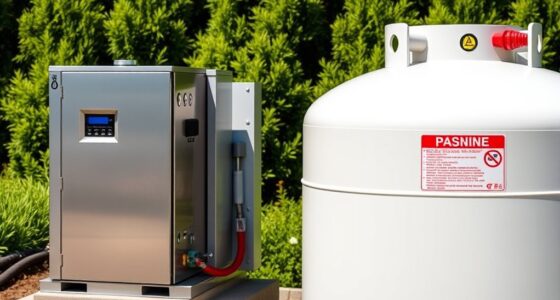To prevent fuel contamination and guarantee high quality, store fuel in sealed, clean containers away from sunlight, heat, and moisture. Use fuel stabilizers for long-term storage and select reputable stations with good cleanliness standards. Regularly inspect tanks for water or debris and replace filters promptly. Additives can help maintain fuel integrity. Staying vigilant with these practices keeps your engine running smoothly—continue exploring to uncover more expert tips for ideal fuel care.
Key Takeaways
- Store fuel in cool, dry, sealed containers away from sunlight and heat to prevent contamination and degradation.
- Regularly inspect storage tanks and equipment for leaks, rust, or water, and replace compromised units promptly.
- Use fuel stabilizers and additives during storage and refueling to inhibit microbial growth and maintain fuel quality.
- Source fuel from reputable suppliers with certified, clean, and well-maintained stations to reduce contamination risks.
- Recognize signs of poor-quality fuel, such as engine misfires or reduced efficiency, and address contamination issues promptly.
Understanding Fuel Types and Their Impact on Your Engine

Understanding the different fuel types is essential because each one affects your engine’s performance and longevity in distinct ways. Fuel blending combines various fuels to optimize performance, but improper mixes can cause issues like knocking or incomplete combustion. You should also consider alternative fuel options, such as ethanol blends or biodiesel, which can reduce emissions and improve engine efficiency. Different fuels have unique properties—like volatility, energy content, and cleanliness—that influence how your engine runs. Using the right fuel type guarantees smoother operation and reduces wear and tear over time. Being aware of these options helps you make informed decisions, avoid damage, and keep your engine running reliably for longer. Additionally, choosing appropriate fuels can help mitigate potential risks associated with emerging payment security threats and regulatory compliance challenges, ensuring your engine remains protected and compliant over time. Proper fuel choice is a key part of maintaining your vehicle’s overall health.
How to Spot the Signs of Poor-Quality Fuel
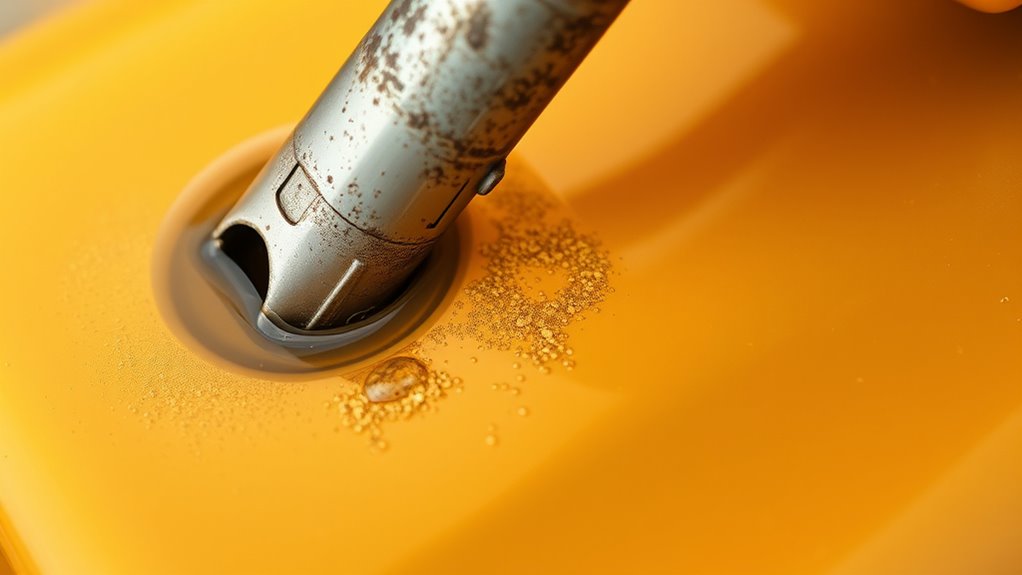
Poor-quality fuel can cause immediate and noticeable issues with your vehicle’s performance, so it’s important to recognize the warning signs early. You might notice rough idling, engine misfires, or reduced power. Fuel additives meant to improve fuel quality may be ineffective or absent, leading to poor fuel efficiency. Gasoline with contaminants can cause knocking or hesitation during acceleration. Additionally, the color accuracy of the fuel can influence engine smoothness and longevity.
Common Sources of Fuel Contamination

Water can sneak into your fuel through leaks or condensation, leading to corrosion and engine issues. Dirt and debris often contaminate fuel during handling or storage, clogging filters and injectors. Understanding these common sources helps you prevent costly damage and maintain fuel quality.
Water Intrusion Risks
One of the most common and insidious forms of fuel contamination occurs when water enters storage tanks or fuel lines. Water accumulation can happen through leaks, condensation, or poor handling, and it creates serious corrosion risks inside your fuel system. When water mixes with fuel, it separates and settles at the bottom, making it difficult to detect. Over time, this moisture promotes rust and corrosion of metal components, weakening tanks and lines. Corrosion not only reduces the lifespan of your equipment but can also lead to fuel system failures. To prevent this, regularly check for water build-up, keep tanks sealed tightly, and use water-absorbing additives or filters. Staying vigilant helps you avoid costly repairs and ensures fuel quality remains high. Additionally, understanding fuel system components can aid in identifying potential vulnerabilities and maintaining optimal performance.
Dirt and Debris Contaminants
Dirt and debris are common sources of fuel contamination that can compromise your engine’s performance. They often enter fuel during storage, handling, or refilling. To prevent this, focus on contamination prevention by:
- Using clean, sealed containers for fuel storage.
- Installing proper filters to trap debris before fuel reaches your engine.
- Regularly inspecting and cleaning fuel tanks and lines.
Debris can include dust, rust, and other particles that settle in storage tanks or get stirred up during refueling. Keeping your fuel storage area clean and sealed minimizes the risk. Always use quality filters and replace them regularly. Proper fuel storage and diligent maintenance are your best defenses against dirt and debris contamination, ensuring your engine runs smoothly and efficiently.
Recognizing Symptoms of Contaminated Fuel in Your Vehicle
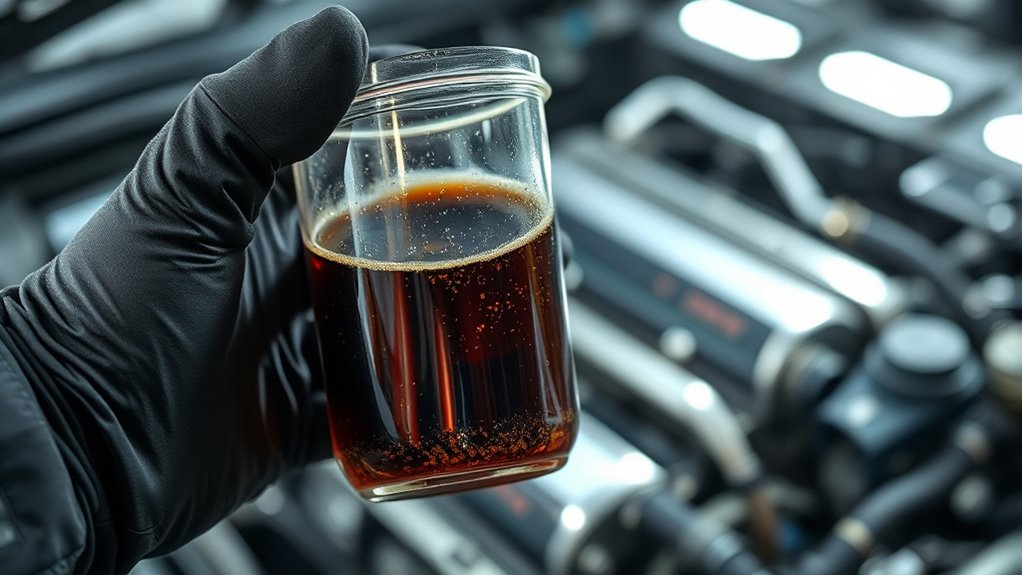
You might notice your engine runs roughly or stalls unexpectedly, which can be a sign of contaminated fuel. Persistent issues with your fuel system, like clogs or irregular pressure, often indicate fuel quality problems. Paying attention to these symptoms helps you catch contamination early and avoid costly repairs. Using fuel with proper filtration technology can reduce the risk of contaminants entering your engine.
Unusual Engine Performance
When contaminated fuel enters your vehicle’s system, it often leads to noticeable changes in engine performance. You might experience rough idling, reduced power, or hesitation during acceleration. These symptoms can directly impact your fuel efficiency and engine tuning, making your vehicle run less smoothly. To spot contamination early, look for:
- Sudden drops in fuel efficiency despite normal driving habits
- Unusual engine noises or vibrations during operation
- Difficulty starting or frequent stalling
- Familiar signs of engine trouble can also indicate the presence of contaminated fuel.
These signs suggest your engine is struggling to perform properly due to poor-quality fuel. Addressing these issues promptly can prevent further damage and keep your engine running reliably. Recognizing unusual engine performance early helps maintain ideal fuel efficiency and ensures your engine stays properly tuned.
Persistent Fuel System Issues
Have persistent fuel system issues started to disrupt your vehicle’s performance? You might notice rough idling, sluggish acceleration, or stalling. These symptoms often indicate contaminated fuel affecting your fuel pump and fuel injectors. Contaminants like water, dirt, or bacteria can clog the fuel filter and cause the fuel pump to work harder or fail prematurely. When fuel injectors become dirty or clogged, they don’t spray fuel properly, leading to misfires and poor engine response. If you’re experiencing these issues, it’s time to check for signs of contaminated fuel. Regular maintenance, including fuel system cleaning and using quality fuel, can prevent these problems. Recognizing the symptoms early helps protect your vehicle’s fuel pump and injectors, saving you costly repairs down the road. Essential oils can also be used to support fuel system health and overall engine performance.
Best Practices for Ensuring Fuel Purity at the Pump
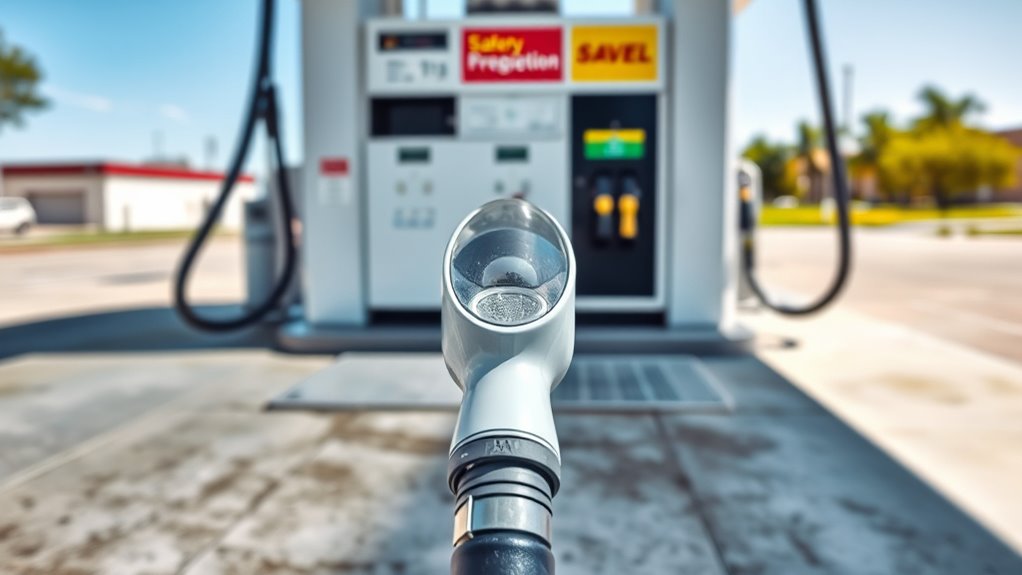
Ensuring fuel purity at the pump is essential for maintaining engine performance and preventing costly damage. To achieve this, you should verify that your fuel source adheres to recognized quality standards and holds proper fuel certification. This guarantees the fuel has been tested and meets industry benchmarks. Here are key practices to follow: 1. Source fuel from reputable suppliers with proven quality standards. 2. Regularly inspect storage tanks and pump equipment for signs of contamination. 3. Confirm that fuel certification documents are up-to-date and compliant with regulations. Additionally, implementing vertical storage solutions can help prevent environmental contaminants from entering fuel supplies, further safeguarding fuel quality.
Tips for Storing Fuel Safely and Preventing Contamination
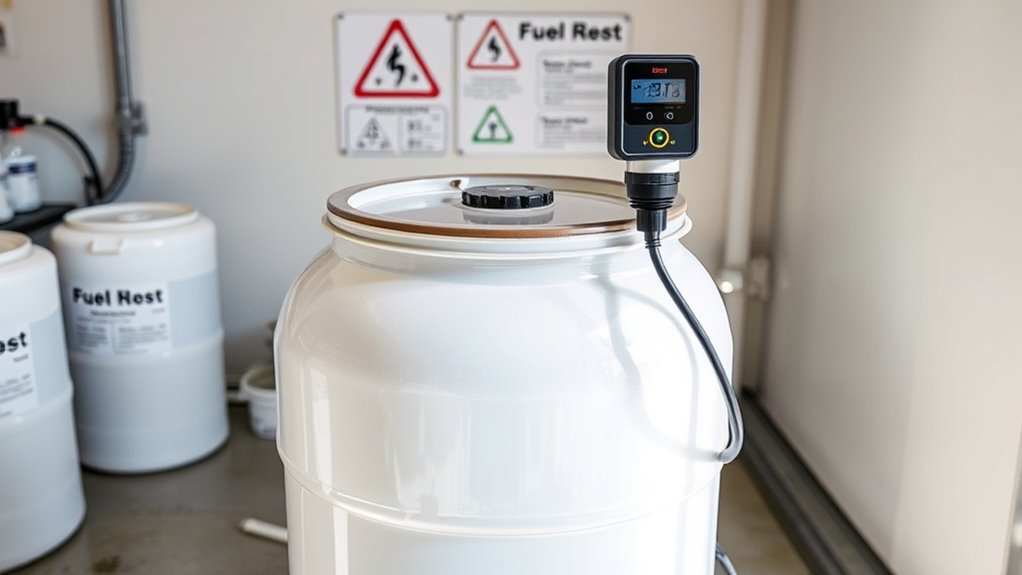
Proper storage of fuel is essential to maintaining its quality and preventing contamination. Use appropriate storage containers designed for fuel, ensuring they are clean, sealed tightly, and made from compatible materials. Keep containers in a cool, dry, well-ventilated area away from direct sunlight and sources of heat or sparks. To further protect your fuel, consider fuel stabilization techniques—adding stabilizers if storing fuel for extended periods. Regularly inspect containers for leaks, rust, or damage, and replace any compromised units immediately. Label your containers clearly with the date of storage to monitor freshness. Properly stored fuel reduces the risk of microbial growth, water intrusion, and degradation, helping you avoid costly engine issues and ensuring your fuel remains clean and effective whenever you need it. Additionally, using vetted storage practices and containers can further enhance safety and fuel integrity during storage.
The Role of Fuel Additives and When to Use Them
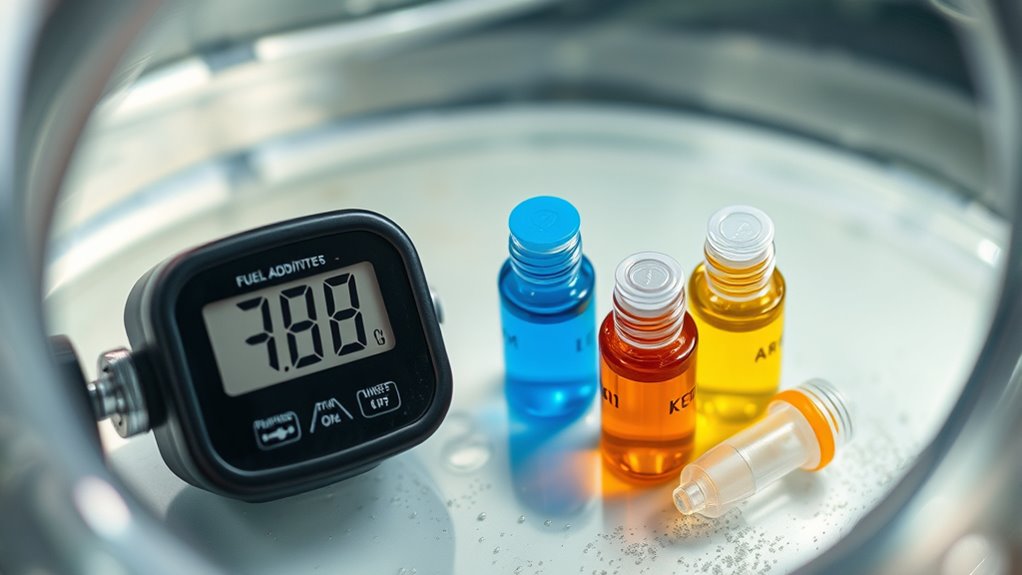
Fuel additives play a crucial role in maintaining fuel quality by enhancing performance and preventing issues like fuel degradation, microbial growth, and corrosion. They provide key fuel additive benefits, such as improving combustion, reducing deposits, and extending storage life. Knowing the right additive application timing ensures maximum effectiveness. To get the best results, consider these points:
Fuel additives prevent degradation, microbial growth, and corrosion—boosting performance and extending fuel and equipment life.
- Use additives when storing fuel for long periods to prevent microbial growth and degradation.
- Apply fuel additives before seasonal changes to optimize engine performance.
- Add them during fuel refills for regular maintenance and to protect against contamination.
- Understanding aura variations can also help in personal awareness and maintenance of emotional balance, paralleling how fuel quality requires regular monitoring and care.
Timely application helps you maintain fuel quality, minimizes engine problems, and prolongs equipment lifespan. Understanding when and how to use fuel additives is essential for reliable, efficient operation.
Regular Maintenance Checks to Detect Fuel-Related Issues
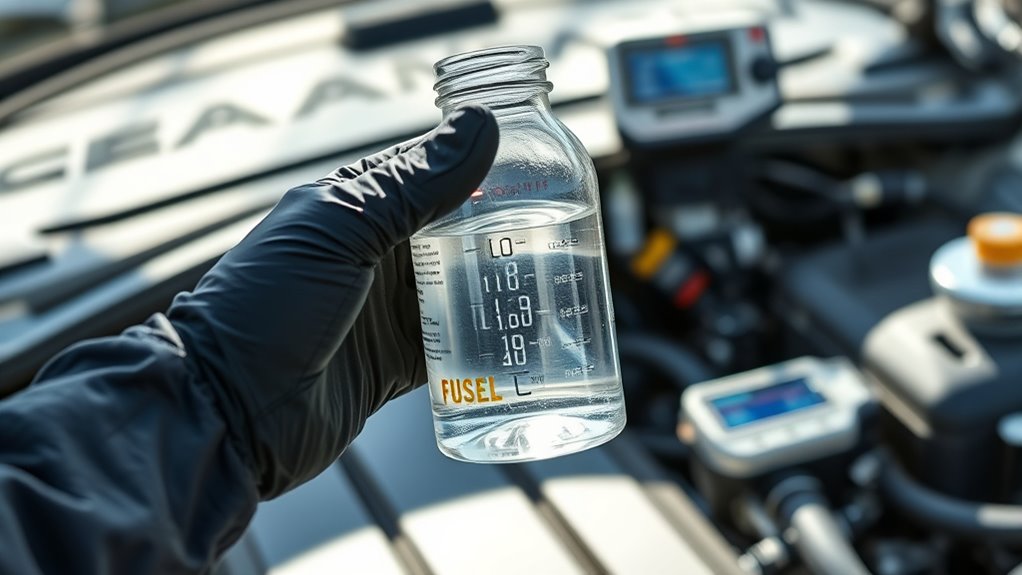
Regular maintenance checks are essential for early detection of fuel-related issues that can impair engine performance and damage equipment. Regularly inspect your fuel storage to identify signs of contamination like water or debris. Confirm that the fuel type matches your equipment’s requirements—using incorrect fuel can cause problems. Check fuel filters and lines for clogs or leaks, especially if you notice engine hesitation or rough running. Keep records of fuel quality inspections to track potential issues over time. Proper fuel storage and correct fuel type selection help prevent contamination. Additionally, verifying fuel quality standards ensures your fuel remains clean and effective.
Choosing Reputable Fuel Stations for Better Quality Assurance
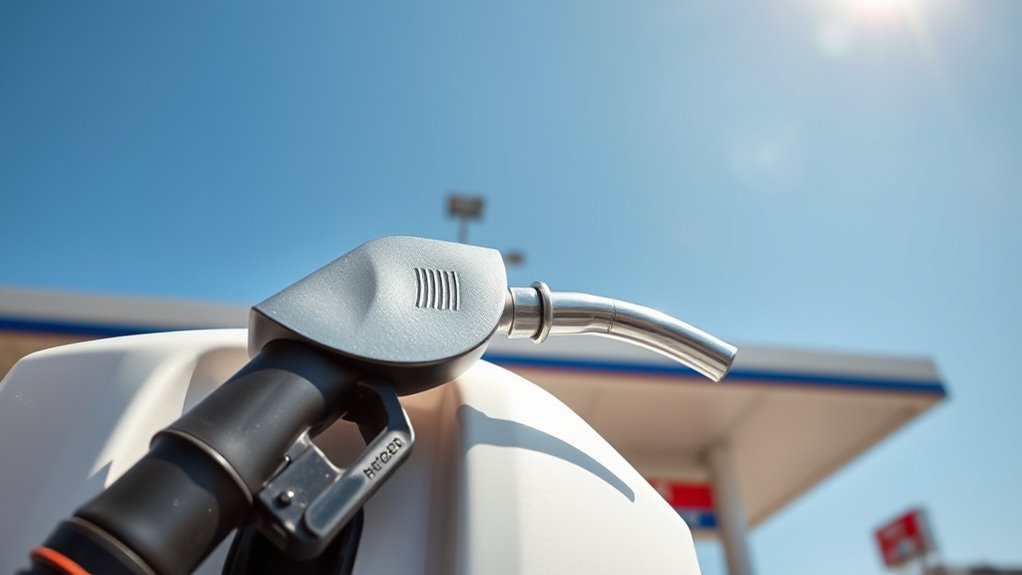
Choosing a reputable fuel station plays a key role in maintaining fuel quality and preventing contamination. A station’s reputation reflects its commitment to clean, well-maintained tanks and proper handling. To guarantee quality, consider these factors:
- Check for consistent positive reviews about fuel quality and station cleanliness.
- Look for transparency in pricing, which indicates honesty and integrity.
- Choose stations that display certifications or quality assurances from industry authorities.
Frequently Asked Questions
How Does Climate Affect Fuel Shelf Life and Quality?
Climate impact profoundly affects fuel shelf life and quality by accelerating fuel degradation. High temperatures cause faster evaporation and promote microbial growth, leading to contamination. Humid conditions introduce moisture, increasing the risk of oxidation and microbial activity. Cold climates can cause wax crystallization, clogging filters. You should monitor storage conditions carefully, as climate variations directly influence fuel stability, requiring you to implement measures like additives or temperature control to maintain fuel quality over time.
Are There Eco-Friendly Alternatives to Traditional Fuel Additives?
Yes, there are eco-friendly alternatives to traditional fuel additives. You can opt for biodegradable additives and plant-based solutions, which help maintain fuel stability without harming the environment. These options reduce harmful emissions and are sustainable choices. By choosing biodegradable and plant-based additives, you support cleaner fuel practices and contribute to environmental preservation, all while ensuring your fuel performs effectively.
What Are the Legal Standards for Fuel Quality in My Region?
You need to follow your region’s fuel regulation and quality standards to make certain of safety and compliance. These standards set limits on contaminants, additives, and fuel properties like octane and sulfur content. Check with your local or national authorities, such as the Department of Energy or environmental agencies, for specific regulations. Staying compliant helps protect your engine, reduces emissions, and avoids potential fines or legal issues related to subpar fuel quality.
Can Fuel Contamination Cause Long-Term Engine Damage?
Think of your engine as a delicate garden that needs pure water to thrive. Fuel contamination risks can introduce dirt, water, or microbes, causing long-term damage like corrosion and clogged injectors. Proper fuel stabilization helps prevent these issues, protecting your engine from gradual wear. Ignoring contamination risks may lead to costly repairs and reduced engine lifespan, so always guarantee your fuel stays clean and stabilized for ideal performance.
How Often Should I Have My Fuel System Professionally Inspected?
You should schedule fuel system inspections at least annually or more often if you notice fuel-related issues. Regular maintenance scheduling helps catch potential problems early and prevents contamination damage. If you operate in a dusty or humid environment, consider more frequent inspections. By staying on top of fuel system maintenance, you guarantee peak performance and avoid costly repairs down the line. Always follow your manufacturer’s recommended inspection intervals for best results.
Conclusion
Now that you know the signs of poor fuel quality and how to prevent contamination, the key is staying vigilant. But what if the fuel at your favorite station isn’t as good as it seems? Keep these tips in mind, and stay alert—because the next time you fill up, a hidden threat could be lurking. Will your next fill-up be trouble-free, or will you uncover a surprise that changes everything?
